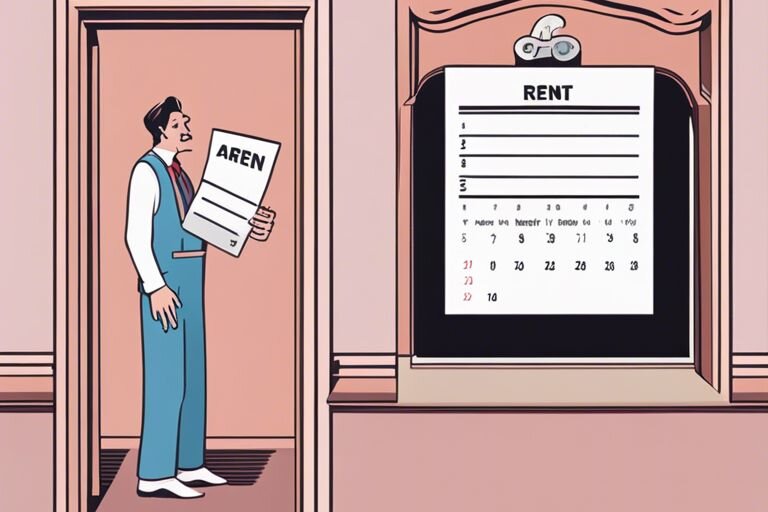Overcoming the challenges of dealing with late or unpaid rent is a crucial skill for landlords facing difficult tenants. In this blog post, we will outline necessary steps that landlords can take to address this issue effectively and regain control of their rental properties. From communication strategies to legal options, these practical tips will provide valuable guidance for landlords navigating the complexities of rent collection.
Key Takeaways:
- Act Promptly: Respond quickly to late or unpaid rent situations to prevent them from escalating further.
- Keep Records: Maintain detailed records of all communication, payment history, and agreements with tenants to protect your rights as a landlord.
- Consider Legal Action: If all attempts to resolve the issue amicably have failed, seek legal advice and consider legal action to protect your interests.
Understanding Your Rights as a Landlord
Reviewing Lease Agreements
An imperative step in understanding your rights as a landlord is to thoroughly review the lease agreements with your tenants. Ensure that all terms and conditions are clear and agreed upon by both parties. Pay close attention to clauses regarding rent payments, late fees, and consequences for non-payment.
Knowing Local Tenancy Laws
To protect your interests as a landlord, you must have a solid understanding of the local tenancy laws that govern rental properties in your area. Familiarize yourself with regulations related to rent increase limitations, eviction procedures, security deposit handling, and tenant rights. Being knowledgeable about these laws will help you navigate any legal challenges that may arise.
Laws regarding landlord-tenant relationships vary from state to state, so it’s crucial to stay informed about the specific regulations in your area. Some states have stringent laws to protect tenants, while others may offer more flexibility to landlords. For example, California security deposit law states that a landlord cannot charge more than 2 months’ rent for a security deposit if the rental is unfurnished. In Texas, landlords are free to set security deposits at any amount. If a tenant from out-of-state disputes this after signing an agreement, you’ll be well within your rights to send a formal demand letter requesting unpaid funds. Consult with legal professionals or landlord associations to ensure you are up to date with the latest legal requirements.
Other Articles You Might Enjoy:
- Essential Steps To Deal With Late Or Unpaid Rent – Help For Landlords With Bad Tenants
- Essential Tips For Landlords Dealing with Rental Property Damage
- Help For Landlords – What To Do When Lease Terms Are Violated
- Steps For Landlords Facing Tenants Who Refuse To Vacate
- Preventing Subletting Without Permission – Help For Landlords With Bad Tenants
Communicating with Your Tenant
Now, when dealing with late or unpaid rent, communication is key. It is important to approach the situation professionally and tactfully. For guidance on what to say or what not to say, refer to What to Do (and What Not to) When a Tenant’s Rent Is Late.
Initiating the Conversation
To address late or unpaid rent, initiate a respectful dialogue with your tenant. Approach the conversation with empathy and understanding, but also make it clear that rent must be paid on time to avoid repercussions.
Documenting All Communications
The key to managing late rent situations effectively is by documenting all communications with your tenant. Keep track of phone calls, emails, letters, and in-person conversations. This documentation will serve as a record of your attempts to address the issue and can be vital if legal action is required.
With detailed records of your interactions, you will have a clear timeline of communication to support your case should you need to take further steps to resolve the situation. It also shows your diligence and professionalism in handling the matter.

Resolving Payment Issues
Once again, you find yourself in a situation where a tenant is failing to pay rent on time. Dealing with late or unpaid rent can be stressful for landlords, but there are steps you can take to resolve payment issues effectively.
Setting Up a Payment Plan
Setting up a payment plan with your tenant can be a beneficial way to address late or unpaid rent. By breaking down the outstanding amount into manageable installments, you can help your tenant catch up on payments while avoiding costly legal proceedings. Make sure to have a written agreement in place outlining the terms of the payment plan to protect both parties.
Considering Late Fees and Grace Periods
Setting up a clear policy regarding late fees and grace periods can help deter tenants from paying rent late. Consider implementing a grace period of a few days after the due date before late fees kick in. Clearly outline these policies in the lease agreement to avoid any confusion with tenants.
Considering the implementation of late fees can also provide an additional incentive for tenants to pay rent on time. Make sure to comply with local laws and regulations regarding late fees to avoid any legal issues.

TX Cash Home Buyers Gives Multiple Offer Options!
Unlock the potential of your home with our multiple offer options. Discover what you qualify for and make informed decisions with confidence.
Taking Legal Action
When to Send a Formal Notice
Many landlords wonder when is the right time to send a formal notice to tenants who are late on rent. The best practice is to send a formal notice immediately after the rent is past due, typically within the first 5-7 days of the month. This formal notice serves as a written record of the situation and can be used as evidence in the event of further legal action.
The Eviction Process
Process: To properly begin the eviction process, landlords must first serve the tenant with a formal eviction notice. This notice must include the reason for the eviction, the amount of time given for the tenant to vacate the premises, and any other relevant details. The tenant then has the opportunity to either comply with the eviction notice or contest it in court.
Another important aspect of the eviction process is ensuring that all legal requirements are met. This includes following state and local laws regarding eviction procedures, providing proper notice to the tenant, and documenting all communication and actions taken throughout the process. Failure to adhere to these requirements can delay the eviction proceedings and potentially harm the landlord’s case.
Protecting Yourself for the Future
To How to Handle Tenants With Late Rent Payments is crucial for landlords facing challenges with late or unpaid rent. While it’s important to address current issues, it’s equally important to protect yourself from future problems.
Tenant Screening Best Practices
Tenant screening is your first line of defense against potential rent payment issues. Conduct thorough background checks, including credit history, employment verification, and previous rental references. Look for red flags like inconsistent income, past eviction records, or poor credit scores. This process will help you select reliable tenants who are more likely to pay rent on time.
Creating a Financial Buffer
Best practice is to create a financial buffer to cushion any financial setbacks caused by late or unpaid rent. Set aside a portion of the rental income each month into a separate account specifically for emergencies or rental income loss. This buffer will come in handy during unforeseen circumstances such as a tenant’s job loss or unexpected repairs, ensuring you can cover expenses without relying solely on the rent payments.

1. Communicate openly with tenant about late payment issues.
2. Understand tenant’s financial situation before taking action.
3. Offer payment plans for tenants struggling to pay rent.
4. Serve official notice if rent remains unpaid.
5. Seek legal advice if tenant continues to avoid payment.
6. Consider eviction as a last resort for non-payment of rent.
Summing up
Therefore, dealing with late or unpaid rent can be a challenging situation for landlords. By following these steps, you can protect your rights as a landlord and effectively handle problematic tenants. It is important to stay organized, communicate clearly, and take appropriate legal action when necessary. Recall, it is crucial to act promptly and assertively to address late or unpaid rent to maintain the financial health of your rental property. Utilizing these strategies can help you navigate difficult situations with bad tenants and protect your investment as a landlord.
FAQ
Q: What are the consequences of late or unpaid rent for landlords?
A: Late or unpaid rent can impact landlords financially by affecting cash flow and potentially leading to legal expenses associated with eviction proceedings.
Q: How can landlords prevent late or unpaid rent situations?
A: Landlords can prevent late or unpaid rent by thoroughly screening tenants before leasing, setting clear rent payment terms in the lease agreement, and enforcing consequences for late payments.
Q: What steps can landlords take when rent is late?
A: Landlords can send a late rent notice, communicate with the tenant to understand the reason for the late payment, offer payment plans if necessary, and take legal action if the situation persists.
Q: Can landlords charge late fees for overdue rent?
A: Yes, landlords can charge late fees for overdue rent as long as the amount and conditions for late fees are clearly outlined in the lease agreement and comply with state laws.
Q: What should landlords do if a tenant consistently fails to pay rent?
A: If a tenant consistently fails to pay rent, landlords can issue a pay or quit notice, start the eviction process if necessary, and consider professional help from a property management company or legal advisor.
Disclaimer:
The content provided on this blog is for informational purposes only. We are not attorneys or tax professionals. For personalized legal or tax advice, please consult with a qualified professional.
Written by Lisa Martinez, Founder of TX Cash Home Buyers

About The Company
TX Cash Home Buyers helps Texas homeowners sell quickly and simply — even in tough situations like repairs, inherited homes, or financial stress. Founded by Lisa Martinez, we’re known for our local experience, fair offers, and commitment to guiding sellers through off-market sales with clarity and care.




